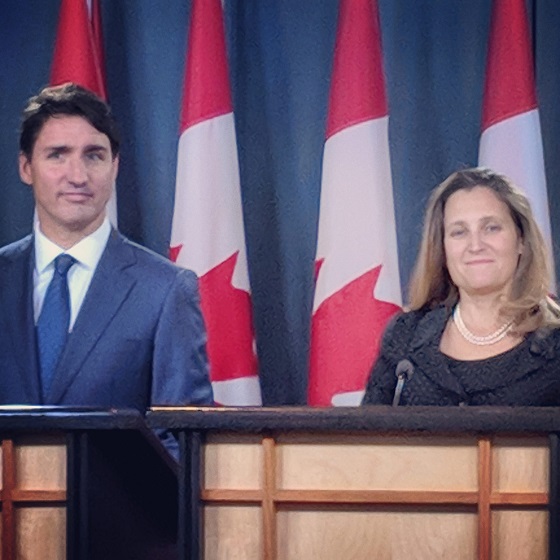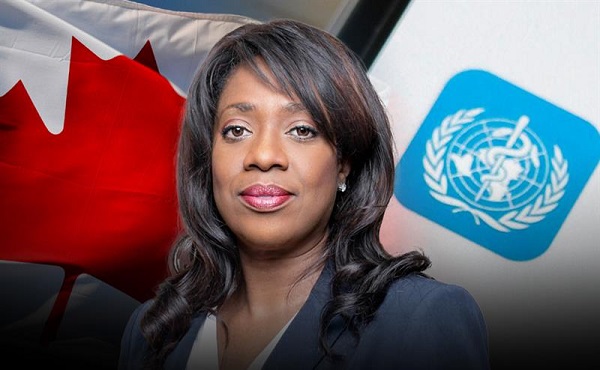National
Paul Wells: The Second Finance Ministers Club

I want to write 5,000 words of narrative in the wake of Chrystia Freeland’s resignation, but we’re still in the middle of the story. Thoughts kind of pour out. I found myself telling La Presse, “‘What the f—k?’ has replaced ‘Hello’ as the standard greeting in Ottawa since Monday.” We’ll see whether they use that quote.
Here are some thoughts, from different angles. I don’t know whether Freeland’s resignation will blow over, the way Justin Trudeau’s last 20 messes did, because I don’t have a crystal ball, but I think Justin Trudeau hopes it’ll blow over. Because he always hopes it’ll blow over. I hear, as you do, rumours that the PM will resign.
On Monday night at the Laurier Club he didn’t look like he’d received the memo yet. On Tuesday his staff cancelled his year-end interviews, something I’ve never seen in 30 years in Ottawa. We’ll see.
Meanwhile, some thoughts.
1. A very British resignation
A standard conversational gambit in Ottawa this week is to point out that nobody’s ever seen a resignation letter like Freeland’s — I’ve given it some thought, and I’ve decided you’re a dink. (I paraphrase, barely.) Except that’s not quite true. Millions of people have seen dozens of resignation letters like it, because you see them every few weeks in the United Kingdom. And Chrystia Freeland was an editor in London for the Financial Times for years.
Canada is in some ways an unhealthily reticent country. I once covered an international summit where the only reason I knew anything the Canadian delegation had done was that I was sitting next to the journalists from France and I could overhear the French government’s briefings. Resignation letters here follow suit: it’s been a privilege, more time with my family, and out. You’re often left wondering, if you loved the boss so much, why leave?
But in England…
Rosie Duffield to Keir Starmer: “How dare you take our longed-for victory, the electorate’s sacred and precious trust, and throw it back in their individual faces and the faces of dedicated and hardworking Labour MPs?! The sleaze, nepotism and apparent avarice are off the scale. I am so ashamed of what you and your inner circle have done to tarnish and humiliate our once proud party.”
John Glen to Boris Johnson: “I can no longer reconcile my commitment to the role and to the financial services sector with the complete lack of confidence I have in your continuing leadership of our country… [R]ecent events concerning the handling of the appointment of the former Deputy Chief Whip, and the poor judgement you have shown, have made it impossible for me to square continued service with my conscience. The country deserves better…”
Nadine Dorries to Rishi Sunak: “You flashed your gleaming smile in your Prada shoes and Savile Row suit from behind a camera, but you just weren’t listening… But worst of all has been the spectacle of a prime minister demeaning his office by opening the gates to whip up a public frenzy against one of his own MPs…Since you took office a year ago, the country is run by a zombie Parliament where nothing meaningful has happened. What exactly has been done or have you achieved?”
This newsletter is my full-time job. Paid subscriptions at $5 a month or $50 a year are a great way to read all my work here.
2. The Zoom call
I resist biography as an analytical tool. People outgrow their backgrounds all the time.
But just about everybody who follows politics has been wondering how Trudeau could fire his most loyal lieutenant by a Zoom call three days before he needed her to deliver a crucial fall economic statement. If the Globe’s latest story is true, and he told her Mark Carney would take the job without knowing whether Carney will take the job, that’s even wilder. Who does that?
The short answer is, somebody who is used to getting his way. Then you look at Trudeau’s life and you think, why wouldn’t he expect to get his way?
The rich kid always knows the normies will cover for him. If he needs a ride, some kid with stars in his eyes will wave his keys and volunteer. If he’s hung over he can borrow the lecture notes. He shows up in racist makeup to yet another party — forcing every other person in the venue to decide how to respond — and once again nobody stands up to him or makes a fuss. Indeed, when the record of that behaviour threatens his political career decades later, there’ll be plenty of volunteers to criticize anyone who mentions the record, rather than criticizing the guy who acted like that.
He runs for the leadership of a national political party on a platform of “I’ll tell you what I stand for after I win.” He mentions carbon pricing precisely one time at his first national leaders’ debate. He dumps his electoral-reform promise at the first hurdle, and later, when asked about it, he blames the person who asks. He gaslights Canada’s first Indigenous attorney-general for months, but he is not particularly kinder to her replacement, who is ejected from Cabinet because, I don’t know, it’s Wednesday or whatever. He lets a 72-year-old man run for re-election and only after it’s over does he let the guy know he’s getting dumped from Cabinet.
He fires the Clerk of the Privy Council by news release while travelling.
In particular, if there’s anyone in the world he might have expected to tolerate the kind of high-handedness we’re hearing about Friday’s Zoom call, it’s Chrystia Freeland. Her eagerness to endorse him in the immediate aftermath of his latest cockup has been such a reliable feature of Canadian public life it’s devolved into a kind of shtick. SNC-Lavalin, 2019: “she has absolute confidence.” Blackface, six months later: “tremendous confidence.” WE Charity, 10 months after that: “The prime minister has my complete confidence.”
Perhaps only Jagmeet Singh has shown more confidence than Freeland, over the years, in Trudeau’s leadership. Given that record — and his own much longer record of taking advantage of others’ generosity — it’s not too much of a stretch to think that at some point he decided his deputy prime minister was just another easy mark.
Turns out that’s the kind of mistake he only needed to make once.
3. Speaking of Jagmeet Singh
He’ll qualify for his pension in 70 days. After his astonishing scrum on Monday, he might as well put it on a T-shirt.
4. After Trudeau
Say he quits. What next?
Here’s something I’m starting to hear from Liberals. I don’t believe I’m the first to write about it, but it hasn’t received enough attention yet.
Can the party ensure the legitimacy of its leadership succession process?
I suspect some large number of the presumed candidates for his succession won’t run. They haven’t exactly been a bold lot so far. But assume for the sake of argument that there are four or five candidates, and none has an insurmountable advantage.
The Liberal Party transformed its leadership-selection process for the 2013 race: preferential vote among “supporters.” Supporters didn’t need any record of involvement with the party, didn’t need to pledge any support, didn’t need to pay a dime in return for voting rights. Whee! Populist rush: 300,000 people registered as supporters, 130,000 voted. Trudeau won overwhelmingly on the first ballot. Of course: he was the only candidate most people voting in the contest had ever heard of.
After a big defeat, or with such a defeat looming, figure far less than half as many people would be involved next time. Say, very generously, 40,000 supporters.
How hard would it be to rig that contest for mischievous purposes or worse? Probably not hard enough. In a vote open to every random “supporter,” it would take only a few thousand, or tens of thousands, of supporters to capture a major national political party for any cause or faction that might want one.
I traded emails with a former senior Liberal organizer about all this today. Without prompting, this veteran of many leadership contests mentioned the need to “ensure… that groups not Liberal-friendly are not organizing to disrupt the democratic process within the Party.” Those groups could include supporters of one side in the Israel-Hamas dispute. Or proxies for a hostile regime. Or pro-life or anti-MAID or anti-vaccine groups. Or practical jokers: Could the process as currently constituted block a write-in campaign for Doris Day?
This newsletter is my full-time job. Paid subscriptions at $5 a month
or $50 a year are a great way to read all my work here.

Business
Ford’s Liquor War Trades Economic Freedom For Political Theatre

From the Frontier Centre for Public Policy
By Conrad Eder
Consumer choice, not government coercion, should shape the market. Doug Ford’s alcohol crackdown trades symbolic outrage for sound policy and Ontarians will pay the price
Ontario politicians have developed an insatiable appetite for prohibition. Having already imposed a sweeping ban on all American alcohol, Premier Doug Ford has now threatened to remove Crown Royal, Smirnoff and potentially other brands from LCBO shelves. Such authoritarian impulses reflect a disturbing shift in our political culture—one that undermines economic prosperity and individual liberty.
After Diageo, the multinational behind brands like Crown Royal and Smirnoff, announced in August that it would close its Amherstburg, Ont., bottling facility, affecting 200 workers, the political response was swift. NDP MPP Lisa Gretzky urged the government to retaliate by pulling Crown Royal from LCBO shelves. Days later, Ford dramatically dumped a bottle of the whisky during a press conference, signalling he might follow through.
Now, the premier has escalated the threat, vowing to remove Smirnoff and potentially other Diageo products.
These gestures may make headlines, but they come at a cost. They undermine business confidence, discourage investment, and send the wrong message to employers. More fundamentally, they reflect a poor understanding of how free societies settle disputes and make decisions.
To understand what’s at stake, it helps to consider the two basic mechanisms available to democratic societies: the marketplace and the ballot box. At the ballot box, citizens vote once, and majority rule determines a single outcome. The marketplace, by contrast, allows people to vote continuously with their dollars. Individuals make countless choices reflecting their own values and priorities. You get what you choose—without overriding anyone else’s preference.
There’s a role for government in correcting market failures, where there’s fraud, monopoly power or public risk. But banning legal products simply because of political displeasure with a company’s decision is not market correction. It’s coercion.
Diageo’s decision to close a facility may be unfortunate, but it doesn’t involve deception, unfair dominance, or harm to the public. Bans aren’t rooted in sound principle; they’re political, plain and simple.
Some argue the government is justified in acting to protect Ontario jobs. But that line of thinking is short-sighted. If job protection alone warranted banning products, we’d resist every innovation or trade deal that disrupted the status quo. Sustainable job growth depends on encouraging investment and innovation, not shielding every position from change.
The appropriate response to plant closures is policy reform, not retaliation. Ontario should focus on creating an environment where businesses want to invest and grow. That means fostering a stable, competitive business climate with clear rules, reasonable taxes, and efficient regulation. Threatening companies with bans only creates uncertainty and drives investment elsewhere.
With Ontarians spending $740 million annually on Diageo products, removing them from store shelves would impose real economic costs. Consumers would face fewer choices, weaker competition, and higher prices. Restaurants and retailers would be forced to adjust. The LCBO, Ontario’s government-run liquor retailer, would lose sales.
This isn’t hypothetical. The province’s ban on American alcohol is already projected to block nearly $1 billion in annual sales, while doing nothing to benefit Ontario consumers. The LCBO is serving political interests, not the public.
Supporters of such bans often reveal their lack of confidence in public opinion. Rather than persuade others to boycott a product voluntarily, they demand that government enforce a blanket restriction.
There’s a better way. Consumer-led boycotts offer accountability without coercion. They allow individuals to act on their beliefs without forcing others to comply. And they tend to be more effective, as companies respond faster to falling sales than to political theatrics.
But the issue at hand goes beyond liquor. It’s about whether elected officials should impose a single set of preferences on everyone, or whether citizens are trusted to decide for themselves.
Each new ban makes the next one easier to justify. Over time, these interventions accumulate and normalize government interference in private choice. Unlike consumer preferences, which can shift quickly and reverse, government prohibitions often persist. The LCBO’s century-old structure is evidence of how long some policies endure, even when they no longer serve the public interest.
This isn’t a call to eliminate government’s role. But it is a call for principled governance, the kind that distinguishes between legitimate oversight and overreach rooted in symbolism or political frustration.
Ontario’s government would do better to focus on long-term prosperity. That means building an economy where investors feel welcome, businesses can grow, and consumers are free to choose.
Ontarians are perfectly capable of making their own choices about which products to buy and which companies to support. They don’t need politicians like Ford making those decisions for them.
Conrad Eder is a policy analyst at the Frontier Centre for Public Policy.
Health
Leslyn Lewis urges Canadians to fight WHO pandemic treaty before it’s legally binding

From LifeSiteNews
Conservative MP Leslyn Lewis is urging Canadians to demand a parliamentary debate on the WHO Pandemic Agreement, highlighting risks to national sovereignty.
Conservative Member of Parliament (MP) Leslyn Lewis called on Canadians to petition against the World Health Organization’s (WHO) pandemic treaty before it becomes legally binding.
In an October 23 post on X, Lewis encouraged Canadians to demand that politicians debate the WHO Pandemic Agreement before it becomes law after warnings that the treaty could undermine national freedom and lead to global surveillance.
“I have raised red flags about its implications on Canada’s health sovereignty and the federal government’s willingness to enter a legally binding treaty of this weight without any input from Parliament,” she declared.
In May, Canada, under Liberal Prime Minister Mark Carney, adopted the treaty despite warnings that the agreement gives the globalist entity increased power in the event of another “pandemic.”
However, Lewis revealed that since the agreement has yet to be officially signed, Canada is not bound to it and can still make amendments.
“We are now in a critical window of opportunity to ask tough questions and debate the treaty before it is signed by the Minister of Foreign Affairs and binds our nation,” she explained.
Lewis encouraged Canadians to sign a petition calling for a debate of the agreement as well as contacting their local MPs to request a parliamentary review of the treaty.
Lewis revealed that Canadians’ persistent opposition to the treaty has already resulted in some of the more dangerous clauses, including restricting free speech, freedom of movement, and government surveillance, being removed from the final agreement.
“Thanks to the engagement of countless Canadians and concerned citizens around the world, the most extreme provisions in the WHO Pandemic Treaty were removed — these measures would have undermined national healthcare sovereignty and given international bureaucrats sweeping powers,” Lewis declared.
“The removal of provisions on vaccine mandates, misinformation and disinformation, censorship requirements, travel restrictions, global surveillance, and mandatory health measures happened because people paid attention and spoke up,” she continued.
Among the most criticized parts of the agreement is the affirmation that “the World Health Organization is the directing and coordinating authority on international health work, including on pandemic prevention, preparedness and response.”
While the agreement claims to uphold “the principle of the sovereignty of States in addressing public health matters,” it also calls for a globally unified response in the event of a pandemic, stating plainly that “(t)he Parties shall promote a One Health approach for pandemic prevention, preparedness and response.”
-

 Business1 day ago
Business1 day agoTrans Mountain executive says it’s time to fix the system, expand access, and think like a nation builder
-

 Alberta2 days ago
Alberta2 days agoPremier Smith sending teachers back to school and setting up classroom complexity task force
-

 Addictions1 day ago
Addictions1 day agoThe Shaky Science Behind Harm Reduction and Pediatric Gender Medicine
-

 Alberta2 days ago
Alberta2 days agoThousands of Albertans march to demand independence from Canada
-

 Crime2 days ago
Crime2 days agoSuspect caught trying to flee France after $100 million Louvre jewel robbery
-

 Business1 day ago
Business1 day agoClean energy transition price tag over $150 billion and climbing, with very little to show for it
-

 Business1 day ago
Business1 day agoFlying saucers, crystal paperweights and branded apples: inside the feds’ promotional merch splurge
-

 MAiD16 hours ago
MAiD16 hours agoStudy promotes liver transplants from Canadian euthanasia victims










